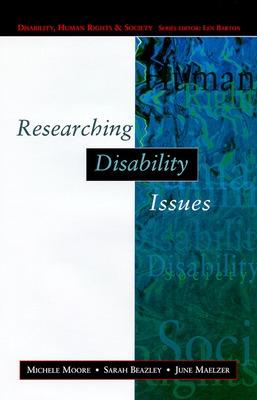Disability, Human Rights & Society
1 total work
Researching Disability Issues
by Michelle Moore, Sarah Beazley, and June Maelzer
Published 1 January 1998
This book is designed to meet a growing need for clear illustrations of how to carry out research which seeks to explore disability issues. It aims to demonstrate the value of a critical attention to social, rather than medical starting points for researching disability, through reviewing a variety of studies which look at different aspects of disabled people's lives. Different methodological approaches and research techniques are considered ranging from analysis of observation data concerning disabled children in schools to rich conversation based data which focuses on family life. A central theme concerns the pivotal role of disabled people in research. The book provides substantive examples of the dilemmas which face researchers and connects these to ideas for individual personal action. Disabled and non-disabled researchers, professionals and students from a wide range of disciplines will find the presentation of both research findings and debates informative and of interest.
